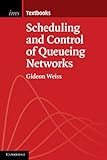Scheduling and control of queueing networks
Material type: TextPublication details: Cambridge University Press Cambridge 2022Description: xv, 430 pISBN:
TextPublication details: Cambridge University Press Cambridge 2022Description: xv, 430 pISBN: - 9781108401173
- 004.601 WEI
| Item type | Current library | Collection | Call number | Copy number | Status | Date due | Barcode | |
|---|---|---|---|---|---|---|---|---|
 Book
Book
|
Indian Institute of Management LRC General Stacks | IT & Decisions Sciences | 004.601 WEI (Browse shelf(Opens below)) | 1 | Available | 005560 |
Applications of queueing network models have multiplied in the last generation, including scheduling of large manufacturing systems, control of patient flow in health systems, load balancing in cloud computing, and matching in ride sharing. These problems are too large and complex for exact solution, but their scale allows approximation. This book is the first comprehensive treatment of fluid scaling, diffusion scaling, and many-server scaling in a single text presented at a level suitable for graduate students. Fluid scaling is used to verify stability, in particular treating max weight policies, and to study optimal control of transient queueing networks. Diffusion scaling is used to control systems in balanced heavy traffic, by solving for optimal scheduling, admission control, and routing in Brownian networks. Many-server scaling is studied in the quality and efficiency driven Halfin–Whitt regime and applied to load balancing in the supermarket model and to bipartite matching in ride-sharing applications.
There are no comments on this title.
